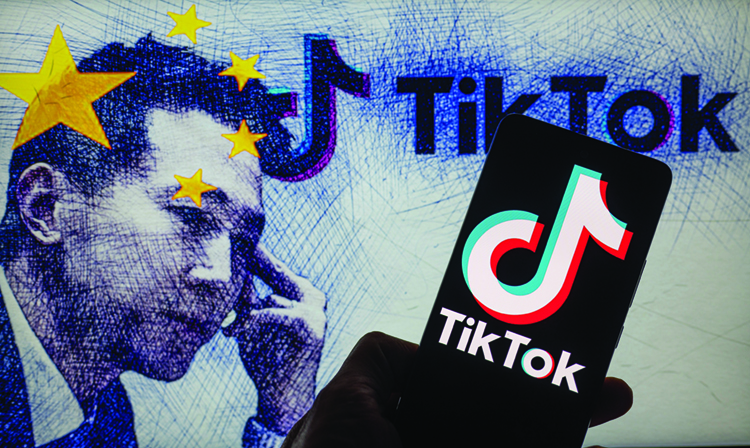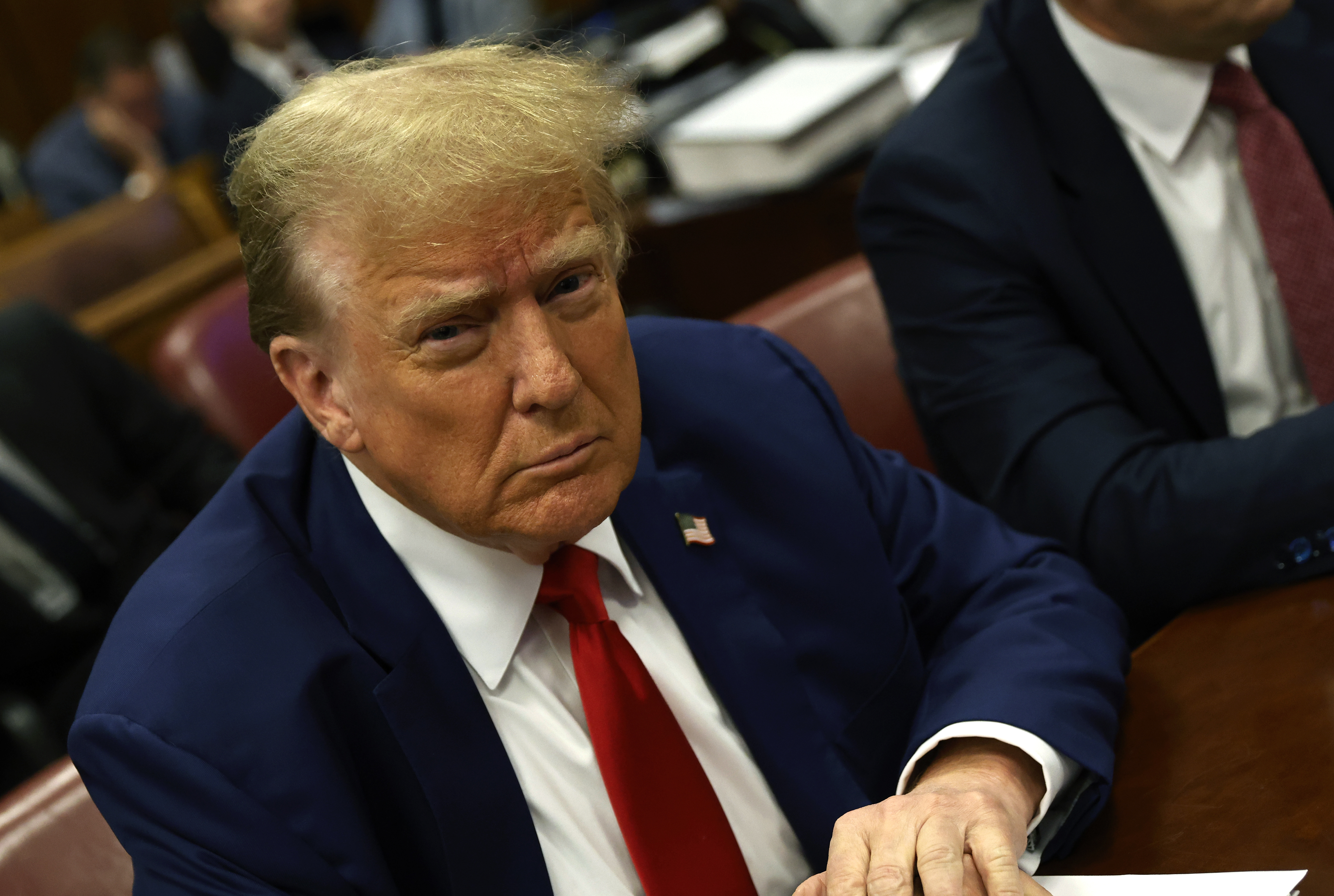TikTok ban might sting legal influencers, but they have plenty of other options

Sketch of Tik Tok CEO Schou Zi Chew by Jonathan Rea/NurPhoto via AP
At first blush, TikTok videos about a first-year associate talking down to a paralegal or a law firm partner working from home in his sweatpants might not look like a winning formula for viral content.
But somehow legal influencer and lawyer Alex Su, whose TikTok handle is @legaltechbro, has amassed more than 100,000 followers and millions of likes by creating skits about attorneys and law firm culture that hit a nerve.
“By telling the truth, a lot of these things are funnier than you expect. People are like, ‘I can relate to that. I remember when that happened to me too,’” Su says.
Su, the head of community development at the digital contract management company Ironclad, embraced the popular short-form video app during the early months of the pandemic in 2020. TikTok helped Su attain minor internet celebrity status, and he says it also was invaluable as a business development, sales and marketing tool, opening doors to meetings that might have otherwise been hard to come by.
But the app is trending for the wrong reason these days. In late March, lawmakers in Washington, D.C., grilled TikTok CEO Shou Zi Chew after claiming the app, owned by Beijing-based ByteDance, is a national security threat because of its ties to the Chinese government.
As far back as 2020, President Donald Trump signed an executive order banning TikTok if its owners did not divest, but court action prevented the platform’s removal from U.S. app stores.
In December 2022, Congress banned the app on government-issued devices and networks, and more than half of state governments have banned the app on official devices. Several colleges and universities also have blocked TikTok on their networks.
In March, a dozen U.S. senators proposed legislation that would give President Joe Biden the legal authority to enact a ban. That same month, a House panel also advanced similar legislation. Meanwhile, the Wall Street Journal reported that the Biden administration had warned ByteDance it must divest from TikTok to continue operating in the U.S.
[Editor’s note: On May 17, Montana Gov. Greg Gianforte signed a bill banning the app from operating within the state and forbidding app stores from offering it for download. A TikTok spokesperson called the ban a violation of the First Amendment.]
Any ban would almost certainly face legal challenges for violating the right of freedom of expression. David Greene of the Electronic Frontier Foundation says the government would need to demonstrate a significant governmental interest under the First Amendment. He says TikTok and its users would have legal standing to fight a ban in court.
Jamal Brown, a TikTok spokesman, says a shutdown would be a “ban on the export of American culture and values to the billion-plus people who use our service worldwide.” He cites a collaboration with software company Oracle—known as Project Texas—to house all Americans’ TikTok data in the U.S.
“This initiative has been developed under the oversight of our country’s top national security agencies—plans that we are well underway in implementing—to further secure our platform in the United States, and we will continue to brief lawmakers on them,” Brown wrote in an email.
Keep your options open
Su realized he might be on to something when he posted a video in 2020 about an arrogant first-year associate talking down to an experienced paralegal to the barely suppressed glee of a law firm partner, clerks and a judge. The Weeknd’s “Blinding Lights” soundtracks the 14-second skit.
The video went viral, and Su says it helped him amass more than 10,000 followers overnight.
While he’s concerned about losing that platform, Su knows there are plenty of other ways to get his content out, including TikTok competitors like Instagram Reels and YouTube Shorts. In fact, Su counts LinkedIn as his top social media platform and says TikTok users are a fraction of his fan base.
“I’m using multiple platforms to reach the same audience,” Su says. “If one goes down, then it doesn’t impact me quite so much.”
Su says he doesn’t post on multiple platforms specifically because of the prospect of a TikTok ban but because it is a good practice.
In addition to bans, a social media platform could go out of business or make changes to its algorithms that suppress his content and affect engagement, he says.
Matt Margolis, a legal influencer who has 87,000 followers on TikTok, started experimenting with Instagram Reels in July 2021 because of uncertainty about TikTok’s future. He says he also was cross-posting his videos to LinkedIn.
And he says recent upheavals on Twitter after Elon Musk’s takeover have underlined how important it is for legal influencers to diversify.
“If TikTok is all of a sudden banned and goes down, you just lost all your content,” says Margolis, who is head of community at Lawtrades, a platform for legal freelancers.
Influencer and lawyer Cece Xie also started using TikTok in 2020 to pull back the veil on her life as BigLaw associate and now has more than 400,000 followers and millions of likes. (See “Digital Discovery,” August-September, 2021, page 12.)
“My impetus for starting posting was my birthday in April. I didn’t want to just work and sit on my couch like I did every other day,” Xie says. “So I was like, ‘Maybe I’ll make a TikTok.’”
Xie admits that while the initial prospect of a ban in 2020 put her on edge, she hasn’t paid much attention to the latest efforts to restrict it.
“There’s no real point in stressing about it too much, especially because if you were there in 2020, you stressed about it a lot,” she says.
Margolis would be “bummed” if TikTok were taken down. He says there is “not as much overlap” between audiences on different social media apps as one might think.
That means influencers can’t be certain that the audience they have built on TikTok will immediately cross over to other apps.
“I lose a leg of the chair, the chair may still be able to stand or maybe not,” says Margolis, referring to a potential nationwide ban. “But it’s going to be wobbly, no matter what.”
There are other reasons Margolis would miss TikTok. He credits the platform with helping him build a community, attract clients and new business. He says TikTok’s algorithms are effective in making sure his content is easy to find and gets in front of people who find it relevant. He also says a ban would cut him off from many of the Gen Zers and millennials who use the app.
Xie is taking a break from practicing law to write an insider nonfiction book about BigLaw. As an associate at Morrison & Foerster, TikTok helped her raise her profile and build name recognition with clients—and it gave her a platform to sell her book to Penguin Random House. “I would be a little sad because TikTok has a place [close to] my heart,” Xie says.
Su won’t ever forget the impact TikTok has had on his life. When he blew up on the app, people came up to him on the street or in stores to ask for selfies, and he says fans mobbed him at legal conferences.
“It allowed me to get in touch with the community, make them laugh and make friends. If there’s business development potential in [the app], that’s great; but if not, at least I had a chance to do something fun,” Su says. If TikTok does get banned, he is interested to see which app comes out on top.
Whatever its fate, Margolis says legal influencers will continue to be important in helping change “our perception of the legal industry” and “how we approach issues” in the profession.
This story was originally published in the June-July 2023 issue of the ABA Journal under the headline: “Banned in the USA? A TikTok ban might sting legal influencers, but they have plenty of other options.”
Write a letter to the editor, share a story tip or update, or report an error.


